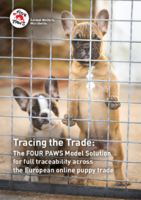
Traceability
The FOUR PAWS Model Solution for full traceability across the European online puppy trade
Identification and registration (I&R) are inseparable components of dog and cat traceability. Traceability, veterinary care and the education of all stakeholders constitute the core of responsible ownership and protection from zoonotic disease.
The EU Pet Passport Regulation has established mandatory electronic identification for all cats, dogs and ferrets moving into and within the EU. The passport and pet microchip enable verification of the vaccination status and health history of an animal. However, the regulation does not include compulsory registration, leaving this responsibility in the hands of the member states. For this reason, full EU traceability cannot yet be implemented. Although mandatory I&R for dogs is already in place in most EU countries, cats are largely not covered. Besides reuniting lost pets with their owners and preventing abandonment, I&R is the only reliable way of tracing disease and controlling health hazards, ensuring consumer protection, tackling tax evasion and curbing illegal trade.
Our calls and actions
FOUR PAWS advocates the mandatory, EU-wide identification (through injectable transponders) and registration (in compatible, harmonised databases) of all cats and dogs. To help combat the exploitative online pet trade, FOUR PAWS has developed a 'Model Solution for full traceability across the European online puppy trade', which requires all puppies to be microchipped and registered, and the seller's details verified, before they can be advertised online.

Cases of Illegal Pet Trade Under the Guise of Private Ownership - Redacted
Examples of Illegal Puppy Traders That Are Presenting Themselves as Private Owners

Feedback to Proposal for a Regulation of the European Parliament and of the Council on the welfare of dogs and cats and their traceability
Read our feedback to the proposal
What you can do:
- Check with your vet and make sure that your pet is identified and correctly registered in a database.
- Make sure that your animal is registered in a database that is part of Europetnet.
- If faced with the choice between the EU Pet Passport and another type of ID, select the EU Pet Passport.
- Control your pet’s microchip number in national databases

